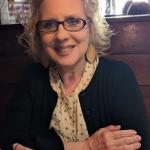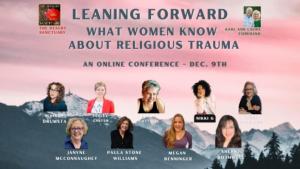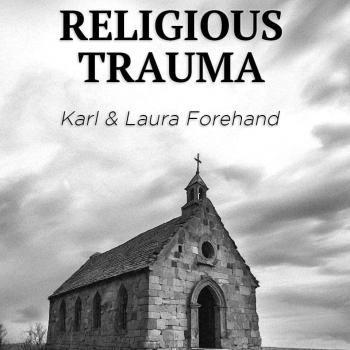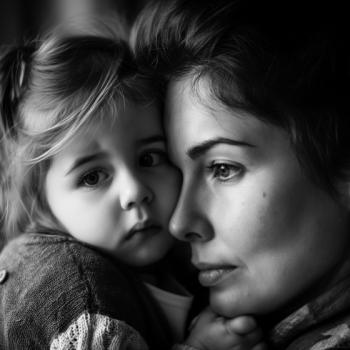Trauma and the Pastor’s Wife

Laura Forehand is a third-grade teacher and former pastor’s wife. She is an advocate for trauma-informed classrooms and an executive board member for Whole Brain Teaching. She and her partner, Karl, formed The Desert Sanctuary, which includes a blog, a podcast, and their best-selling books.
Leaning Forward is the title of a book by Karl and Laura Forehand about moving beyond the confines of organized religion. It is also the title of an online conference we have hosted for several years. This year, we decided to host a series of podcasts primarily to help us understand religious trauma and how to move forward. We are also hosting an online conference with the understanding that amplifying women’s voices is probably the most important component.
Trauma and the Pastor’s Wife

PREVIEW
VIDEO
TRANSCRIPT
Trauma and the Pastor’s Wife by Laura Forehand
Leaning Forward Conference: What Women Know about Trauma
Karl and I recently hosted the Leaning Forward conference. It was our third year, and we hope that people are gaining a lot of insight and information and healing through all of the speakers/authors that are featured.
We co-founded The Desert Sanctuary podcast, and we really enjoy hearing and listening and just being a part of the stories of the people that we’ve interviewed. We consider the stories to be sacred and we’re very thankful that people trust us with their stories. I am a mother of three grown adult children and three amazing grandchildren. When I’m not just snuggling my grandbabies, I am busy being a third-grade teacher. This is my 16th year teaching, and I love my students. Over the last two years, I have learned how to be a more trauma-informed educator in my classroom. So, I am trying desperately to implement those things for the betterment of my students and myself.
There were some good parts to being a pastor’s wife and I think when we first got out of ministry, I was very reluctant to see that. But I would say that one of the best parts of being in ministry with my husband was that we had an opportunity to have a shared vision and to work together to revitalize churches that were literally on the verge of closing their doors. In every church plant that Karl was a part of, these churches were down to about 10 to 12 people, and they were near closing the door when they hired Karl. Especially in our last church, they not only interviewed him, but they interviewed me. So, I assumed there was going to be some shared vision, especially in that last church.
That meant a lot because it allowed Karl and I to work more as a team. In our first church, it was a little more difficult while raising very small children. Our youngest was 6 months old when Karl was at his first church and so much of what happened in ministry was solely on his shoulders. I loved seeing the progression as we transitioned, and our kids got older, and we moved to different churches where we had more of a shared vision, and we went into each new assignment locking arms with each other and having that shared vision.
Trauma and the Pastor’s Wife
Before I dive into the trauma of religion, I want to talk about how trauma is very subjective. I think that is important because there is a phrase that I hear a lot since leaving organized religion when I tell my story. They say, “Well that doesn’t happen in our church” or “That never happened to me.” Unfortunately, those are conversation stoppers. When we say that to someone who has experienced trauma in the church, we stop them from really sharing their story with us.
So, knowing that trauma is subjective, what might have been traumatizing for me may not have been traumatizing for someone else who was a pastor’s wife or within the walls of the church. The opposite is also true that what is traumatizing for someone else may not have been traumatizing for me. The point is that whether it’s true for me or not, their story is valid and so is mine! I just wanted to make that clarification that trauma is subjective, and it is something that we store in our bodies, whether that started in the church or started before the church, is something that I constantly evaluate.
Much of the trauma that I experienced in ministry came from abandonment issues in my childhood with my father. My father was kind of hit or miss with me as a child but then over the last 30 years, he has been absent and not communicating with me, my sisters, his grandchildren, or his great-grandchildren. In addition to that, I have the personality of a rule follower and so as long as I know what the rules are, I will follow them. However the rules of organized religion tend to change. I don’t know what causes them to change, but they tend to change from moment to moment on some things, and on others, they never change. That was always very confusing to me. Because, as long as I know the rules, I’m fine with following them.
I do have some stories of each church that we were a part of. Our first ministry was in a very small town, and it was a village where there were only 250 people there. They were meeting in a double-wide trailer and our family was called and Karl would be the new pastor. With that, in a very small town a lot of times they have things that kind of bring the town together. In this particular instance, it was a street dance, and we were encouraged by church members and other family members of those church members to go to this street dance to get to know people. This would let them know that we were the new pastor and family in town and hopefully, welcome them to our church, and get them to come to our church.
During the street dance a slow song came on. Before the slow song started, Karl and I were just talking to people, introducing ourselves, getting to know people and this song came on and we both agreed to dance with each other in the street at the street dance. We didn’t dance any other dance the rest of that night or dance with any other people. I didn’t even dance with a group of women. Nothing like that! But what happened the next day was so incredibly shocking and shaming to me because what happened was that the people who had encouraged us to go to the street dance were the ones who came down on us for actually dancing at the street dance!
And it was just very shaming. I felt incredibly dirty and as if I had done something so wrong when all I did was have a slow dance with my husband. There was no inappropriate touching or gyrating or anything like that. We simply danced. But I remember that feeling of shame as if it were yesterday. It was just so palatable, and I just really did not even want to show my face around town. As I look back on it now, I realize that I had done nothing wrong, but in that moment, I felt like I had just done something so terrible in the eyes of the Lord, and in the eyes of the church. It was just really hard to live outside of that shame.
Another thing that happened, especially with women in the church. I was ignored a lot, and I was not included in a lot of things. Typically, this would happen when the women of the church were not getting their way and so they would go through me to try to get to Karl. I don’t know if they thought that ignoring me would cause me to run to Karl and get him to change his mind on something. They didn’t know my husband that well because once Karl thinks about things and when he thought that something was the right thing to do, you could plead your case, but he was going to do what was best for the church, the community, and the denomination, and it was very hard to change his mind. I also didn’t feel like it was my job to do that anyway.
People also tried to use our children to get Karl to change his mind. These things were very stressful to me because I felt like here we are in church, and isn’t the Christian Community supposed to be about unconditional love and working together? I felt so often that there was very little distinction between what I was experiencing in the world versus what was going on in church. Everything seemed gray, even though they talked a lot about black and white. Everything seemed to me very much the same as what I had experienced with abandonment and isolation issues. It was happening inside the church and so that never made sense to me and it was very traumatizing.
Then when the rules changed, or Karl decided something they didn’t like, the rules of the game changed, and it surprised me. The dance was a prime example of where it was okay to go to the dance, but nobody said it was not okay to dance with my husband and some people were perfectly willing to tell us about it. I think that’s what brings on a lot of shame and trauma and it’s very deep-seated for me because our identity was wrapped up in everything we did in that community. When we were scolded or ignored, it cut deeper than it would have for others because this was our calling, and it fanned the fires of our past trauma. I’m not saying that all of this started within the church, but the church was not a safe place for me to experience or have more trauma piled on top of the trauma I had already experienced in childhood.
My coping skills, over the 20 years of our ministry, were not the healthiest. I can say that now, looking back. I would tend to isolate myself. I would stay in our small little house with my children and just not venture out. Like I said, when that street dance incident happened, it was very hard for me to show my face in town because I felt so much shame and I didn’t even want to go to the local store to grab a drink. I just felt that all eyes were on me and judging me and so my coping skills were more of isolation and just not getting involved, staying out of the way, making myself small, and losing my voice. Looking back, I think that probably made our particular denomination happy. I was not creating or causing any waves. If I were just small and quiet, they were happy. That was also what most of the churches wanted from the pastor’s wife.
Advice to Religious People
When people talk about fixing the Church or salvaging religion, my answers might surprise you. Even though I found some benefit from the church, I don’t see the need to salvage religion. Religion, especially in the U. S., might be more of the problem than the solution. Spirituality, especially personal spirituality, yes! I believe there’s something to that and I believe we all need to nurture it because it involves a personal connection with ourselves and with the Divine. I think that is important!
But if we’re going to attempt to salvage religion, which I don’t recommend, I almost think that there needs to be a complete dismantling of it. I am not thinking that there’s anything incredibly valuable there. There may be some form of community there, but I feel like since leaving organized religion, Karl and I have found an incredible community outside the walls of the church. We have found a community that is lasting and deep. To make the community of organized religion or the church better, I think we would have to remove the power and control aspects of it. That desire to be in control is what continually shifts the rules like I was talking about earlier. It strands people in a state of shame and unworthiness and questions their very essence.
I think that is what I would probably say to the board of directors, or the women, that every single person is valuable. I do not think religion can be salvaged. I think it needs to be completely deconstructed.
Steps to Healing
Some steps that I’ve taken to heal from my trauma are going inside and finding a spiritual director to talk to. It is important to find somebody who is all about listening and not about fixing. I think hearing stories of other people in the desert has been incredibly healing for me. So much of stepping out into the deconstruction world or stepping outside the walls of organized religion feels very isolating and I felt very alone. While I know I did that while I was inside the church due to shame, it was very lonely when I first chose to deconstruct, and it felt very freeing to know that other people had experienced the same thing. So many times, we think we’re the only ones who are going through whatever it is that we’re going through, and part of the reason for that is because our shame keeps us silent.
Opening up, telling my story, and sharing with other people. Having them share with me helped me realize that there is a community out there of people who have been wounded by organized religion as well. Sharing my story and knowing when and where and with whom to share my story, has been important to me. As Brené Brown says, “People have to earn the right to hear your story,” and I think that’s important. All of this was more difficult, if not impossible, inside of organized religion.
Meditating and just finding time in nature have also been very healing to me, knowing that I’m connected with everything outside of me in a very different way. I also have realized that where I thought that this God, this Divine, was out there somewhere and unattainable, instead of realizing that in nature. I can commune with the Divine just by listening to the birds or feeling the breeze blow through my hair. I would say being out in nature has been probably the most healing thing for me.
I’ve also done some hypnosis and some talk therapy, as well as something called focusing. I think all these things can be beneficial and I think it’s important to find what works for you. Don’t let anyone tell you that any of it is wrong or if we just had enough faith that we wouldn’t need such things. I think they are all valuable tools.
The Hollyn Factor
Hollyn is my first grandchild. About 6 years ago, shortly after she was born, I remember going to the hospital room and holding her for the first time. A sense came over me. It was as if she and I were the only ones in the room. I was holding her right against my heart and I remember putting my head down and it seemed like we were alone. There were other people in the room, but we just had this connection, and it was as if we were eternally connected. I wasn’t sure where I was with God, at that point, but it was as if God had just whispered in my ear, “This is how I feel about you.” It was a connection that goes beyond words, and I do feel like that is about the time that we were beginning to be more vocal about our deconstruction. I think that she was helping me to heal in that moment, realizing that that’s what it’s all about–this connection with self–this connection with Divine that goes beyond words.
Since then, we’ve had two more grandchildren. I connect similarly to them, especially with our grandson because he is non-verbal so we can sit there, and we can snuggle, and it is as if no one else is around us. We can just commune together. So my grandchildren have taught me so much about that sense of belonging—that sense of connection—that sense of oneness with self and with others that transcends words.
Marriage and Religious Trauma
Being trauma-informed has allowed both of us to give each other way more grace than we used to. It allows us to take a breath and listen to the other person. But it also allows us to acknowledge when we are feeling triggered or shame or whatever it is that we’re feeling. We are more able to articulate that. Earlier in our marriage and especially when things were incredibly busy and chaotic in ministry, we didn’t make time for each other to do that. The ministry always came first.
Being trauma-informed has allowed us to not only give each other and ourselves more grace but has allowed us to open up more to each other and be able to be more transparent with how we’re feeling. We can deal with things and not judge each other. So when we’re in a shame spiral or something like that, we are learning to sit with each other not try to fix each other. I think that’s important.
I think we’ve learned from interviews that we’ve had on the Desert Sanctuary. I think early on, we probably felt the need to fix the people that we were interviewing, but through all the things that we’ve learned about being trauma, we now prefer to sit with someone and feel what they’re feeling rather than fixing them. We now know that the idea of coming to an understanding about themselves is going to come from within. So, I think that’s probably the biggest thing that I’ve learned about our marriage in this journey.
Trauma and the Classroom
Currently, the big idea in teaching right now is being a trauma-informed educator. I have been able to go through a couple of professional developments that have helped me understand trauma differently. It is the understanding that these little bodies that are in my classroom have experienced trauma or are experiencing trauma, and so it has helped me be a more compassionate, understanding teacher. It has helped me to have empathy, along with expectations. It’s not about allowing bad behavior, but it’s about trying to drill down and understand and teach students more positive coping mechanisms when they are feeling triggered. I think that is easy to transfer from the classroom to our daily lives and vice versa.
Feeling Effective
I do think that I can be more of an influence now, than inside the church. I think it is primarily because of our former denomination. Women were not necessarily encouraged to be outspoken unless it was in a women’s Bible study or in the nursery or teaching young children in Sunday School. Since leaving organized religion, I have been able to find my voice, and I have been able to speak my truth. In that respect, I am more available to help others by being there for people and listening to those who might be struggling with similar situations.
I encourage everyone to be authentically you. Do not sacrifice who you are, deep in your core, to fit into your church or other areas of your life. Find your truth!
What is it that brings you life?
What is it that brings you joy?
That’s what you need to follow! For me, I think that what I am down deep in my core is wildly passionate about people. I love caring for those in the margins, those who have been marginalized. I realize the things that separate us don’t matter as much as we used to think. What matters is the core of your being which I am encouraging you to explore. External differences matter, but they should be a wonderful discovery instead of a means of division. When we know who we are at the core, we can accept differences and connect with others in a much deeper and more authentic way.
Be authentically you and be kind to each other!
Reclaiming Married Sex from Purity Culture – Megan Benninger
 Karl Forehand is a former pastor, podcaster, and award-winning author. His books include Out into the Desert, Leaning Forward, Apparent Faith: What Fatherhood Taught Me About the Father’s Heart, The Tea Shop and Being: A Journey Toward Presence and Authenticity. He is the creator of The Desert Sanctuary podcast and community. He is married to his wife Laura of 35 years and has one dog named Winston. His three children are grown and are beginning to multiply! You can read more about the author here.
Karl Forehand is a former pastor, podcaster, and award-winning author. His books include Out into the Desert, Leaning Forward, Apparent Faith: What Fatherhood Taught Me About the Father’s Heart, The Tea Shop and Being: A Journey Toward Presence and Authenticity. He is the creator of The Desert Sanctuary podcast and community. He is married to his wife Laura of 35 years and has one dog named Winston. His three children are grown and are beginning to multiply! You can read more about the author here.
















